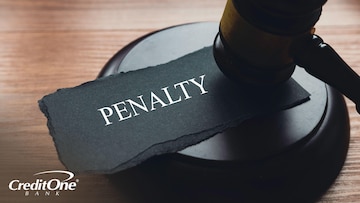Maximizing Your Savings: How Much Money Can You Make With CDs?
September 11, 2023
Topics:
InvestmentsYou’ve probably heard that you can earn money by purchasing a certificate of deposit (CD). But how much can you actually make with a CD, and how do you maximize your savings?

Introduction
If you’re looking to grow your savings, a certificate of deposit (CD) can be a good option. As long as you can leave your money untouched for a certain period of time, that is. CDs come with a predetermined maturity period, or term, and your funds are locked in during that time. When you open your CD, you agree not to withdraw your money before it’s mature — and if you break that agreement you’ll usually have to pay an early withdrawal penalty.
When your CD has matured, the growing process is complete. You are now free to do what you want with the funds you’ve accumulated. In this case, the choices are withdrawing your money, renewing the CD for another term, or rolling it over into a different CD — even creating a CD ladder.
To maximize your CD savings and return, you need to understand how CD rates work, the concept of compound interest, different methods of compounding, and how much money you can potentially make with a CD.
How Do CD Rates Work?
Several factors determine CD rates, including general economic conditions, prevailing market interest rates, and the duration and amount of the CD. But ultimately the financial institution sets the rates it will pay for the privilege of borrowing your money during your CD’s term. As a general rule of thumb, the longer the term, the higher the interest rate. That’s because, with more access to your money, the bank can make better investments.
CDs are usually FDIC insured (or NCUA if it’s through a credit union), making them a relatively low-risk investment choice since up to $250,000 of your money’s protected. The interest rate on a CD is typically higher than on traditional savings accounts, so CDs can be a good way to save for a specific goal, whether that’s a down payment on a house, a new car, or funds for retirement.
But CDs are also less flexible and less liquid than most savings accounts. So you usually can’t take out your money before the CD matures without paying a penalty. The amount varies, but the fine is often based on the interest rate during a set time frame — even up to a whole year’s worth of interest. So if your goal is to make money, it’s definitely worth riding out the full term.
What Is Compound Interest?
“Compound interest is the eighth wonder of the world. He who understands it, earns it ... he who doesn’t, pays it.”
– Albert Einstein
Compound interest is calculated on the initial principal amount (your deposit) as well as any interest you’ve already accumulated from previous periods. In other words, it’s interest on interest. You’ll often see compounded rates referred to as an annual percentage yield (APY).
Let’s say you invest $1,000.00 in a 5-year CD with a 5% interest rate, compounded annually.
- In the first year, you would earn $50.00 in interest (5% of $1,000.00) for a new account total of $1,050.00.
- In the second year, you would earn interest on $1,050.00, which is $52.50 for a new total of $1,102.50.
- In the third year, you earn interest on $1,102.50, which is $55.13, bringing your total to $1,157.63.
Simple interest is calculated on just the principal, not the accumulated interest. So if you were getting simple interest in this example, you would just earn $50.00 each year, for a total of $1,150.00 after the first three years. That might not seem like a huge difference, but compound interest can have a significant impact on your savings over time.
How Are CD Rates Compounded?
CD rates can be compounded using different methods, with daily and monthly compounding being the most common. The more frequently your interest is compounded, the faster your money will grow.
Daily compounding
Daily compounding means that interest is calculated and added to your account balance every day, or 365 times a year, even if you only see it show up monthly.
Monthly compounding
Monthly compounding means that interest is calculated and added to your account balance every month, or 12 times a year.
Quarterly compounding
Quarterly compounding means that interest is calculated and added to your account balance every quarter, or four times a year.
Annually compounding
Annually compounding means that interest is calculated and added to your account balance once a year.
Let’s look again at that scenario where you deposit $1,000.00 in a 5-year CD with a 5% interest rate, but break it down by compounding method.
- Daily compounding earns $284.00 in interest for a final total of $1,284.00.
- Monthly compounding earns $283.36 in interest for a final total of $1,283.36.
- Quarterly compounding earns $282.04 in interest for a final total of $1,282.04.
- Annually compounding earns $276.28 in interest for a final total of $1,276.28.
- Simple interest (not compounded) earns $250.00 in interest for a final total of $1,250.00.
So clearly, more frequent compounding is more desirable. But any compounding provides a significant boost to your savings over simple interest.
To figure out your own return, you can use Investor.gov’s Compound Interest Calculator.
How Much Money Can You Make With CDs?
The amount of money you can make with CDs depends on several things, including the amount of your initial deposit, the interest rate, the compounding method used, and the length of the CD term. Any fees or taxes you have to pay, and market conditions like inflation and changing interest rates, will also affect your net return. But as a general rule, the more money you invest and the longer the term, the more you’ll earn in interest.
Bottom Line
CDs can be an effective tool for maximizing your savings and earning a steady return on your investment. But interest rates vary, and the compounding method plays a crucial role. So shopping around, comparing interest rates, checking out different term lengths and choosing daily compounding will help you achieve the greatest success with CDs.
If you’d like to start that investigation by looking at jumbo CD options — which have a higher minimum deposit requirement, but also usually a higher return — Credit One Bank has several that might fit your needs. You will also see an earning potential calculator to figure out your returns over time.




